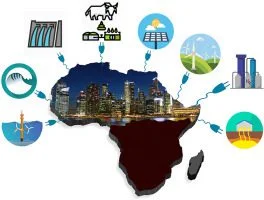Africa is making strides in renewable energy to combat climate change and reduce its dependence on fossil fuels. With vast solar, wind, and hydroelectric resources, the continent is becoming a key player in the global energy transition. This article explores Africa’s renewable energy initiatives, partnerships, challenges, and future opportunities.
Solar Energy Projects and Innovations
Africa receives abundant sunlight throughout the year, making solar power a viable solution for addressing energy shortages. Countries like Morocco and Egypt have established large-scale solar farms, such as the Noor Solar Plant in Morocco, which is one of the largest in the world.
Off-grid solar systems are also improving rural electrification. Companies in Kenya and Nigeria are deploying pay-as-you-go solar solutions, allowing remote communities to access affordable electricity.
Wind and Hydropower Development
Wind power is gaining momentum, with South Africa leading the continent in the development of wind farms. Similarly, hydropower projects along rivers like the Nile and Congo contribute to Africa’s renewable energy mix. The Grand Ethiopian Renaissance Dam, for example, is set to become a major source of electricity for East Africa.
Challenges in Scaling Renewable Energy
Despite progress, Africa faces obstacles such as financing constraints and underdeveloped infrastructure. Many countries struggle to attract investment due to political instability and regulatory hurdles. Additionally, limited access to technology slows down the transition to renewable energy.
Africa’s Future as a Green Energy Hub
With increased investments and international collaborations, Africa has the potential to become a global leader in green energy. Government policies promoting renewable energy adoption, coupled with international funding, are key to achieving this goal.




















